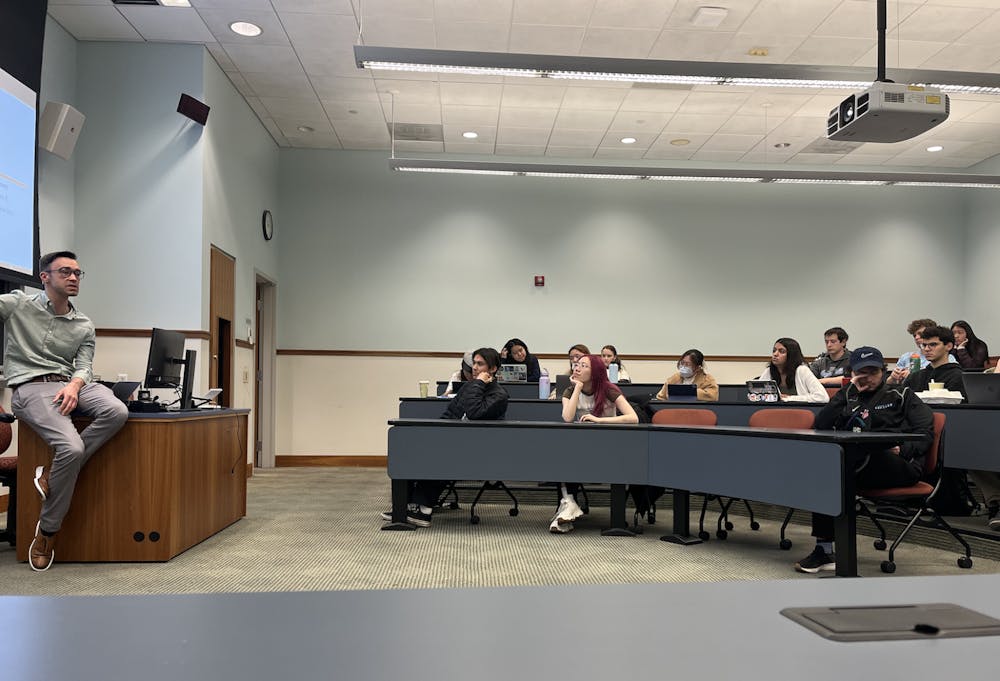The Economic Policy Issues Colloquium (EPIC) held an event titled “Electricity Regulation and the Future of Pollution: Challenges and Tradeoffs” on March 31. The event was led by Jonathan Elliott, an assistant professor in the Department of Economics. Elliott has been working on the regulation of electricity production, which is responsible for about 25% of total global greenhouse gas emissions.
In an email to The News-Letter, Hellen Seshie-Nasser, co-advisor of EPIC and lecturer in the Department of Economics, shared that EPIC invited Elliott as a speaker in response to student interest in global warming and climate change policy issues.
“The topic of pollution, climate change and global warming cannot be overemphasized because of the damming effects on livelihoods, health and life in general,” she wrote. “Hopkins students tend to be well placed in key policy positions after they graduate. It is incumbent on us as faculty to have them exposed to very important topical policy issues that they would encounter as decision makers in the world.”
Freshman Lauren Oster explained why she attended the event in an interview with The News-Letter.
“My interest in economics is mainly about how the field interacts with other fields,” she said. “This event was in line with [my interest] as it addressed environmental issues and its interaction with economics.”
At the talk, Elliott discussed electrical policy issues as it pertained to his recent paper, which examines the electricity market in Western Australia. There are two different factors that contribute to the issue: the environmental concern of having high greenhouse gas emissions and the reliability concern of having a stable supply. According to Elliott, both capacity payments, for reliability policy, and carbon tax, for environmental policy, exist in Australia.
Elliott claimed that, while renewable energy sources are capable of producing emission-free electricity, they are unreliable sources; for instance, wind power cannot generate electricity on days without wind. Elliott pointed to the 2021 Texas power crisis as an example.
“What this means is that, [when] renewable energy replaces fossil fuels, we get more variability in how much electricity you could actually produce in a given moment,” he claimed. “This could potentially lead to an increase in blackouts where the demand exceeds available supply.”
In an interview with The News-Letter, sophomore Zach Martin highlighted that it was interesting to learn of the changing patterns of electricity-production methods.
“One thing that stood out to me the most was how coal for energy is going down in usage. Now, we just have natural gas, but we're also putting up wind farms. The problem with that is wind is not always going to be a factor,” he said. “If there's not enough wind farms and you're getting rid of coal, but the natural gas farms aren't displacing the same amount by which coal is decreasing, then you're going to have blackouts.”
Elliott described that coal and gas capacities are very responsive to subsidy capacity. According to him, the level of emissions will increase greatly with higher subsidy capacity. However, the payments are effective at reducing blackouts as electricity providers have a sufficiently high capacity.
“This suggests that the reason that we haven't seen that much of a decline in coal capacity in Western Australia is it's been propped up by these capacity payments,” he said.
In terms of environmental concerns, there is less carbon emissions when carbon is taxed. Yet, as coal plants retire, blackouts increase. However, Elliot noted that replacing coal plants with wind farms could increase the total capacity and help avoid blackouts even though they are not completely reliable.
Putting these two factors together, Elliott concluded that it is important to keep both subsidy capacity and carbon tax so that electricity supply remains reliable with minimal carbon emission.
“We want to subsidize capacity. We want to keep the coal plants from retiring and make sure that there's a lot of reliable capacity so we don't have blackouts,” he said. “But we want to make it extremely expensive to use those emission-intensive sources so that we only use them when it's the peak of the summer and they're absolutely necessary in order to prevent blackouts.”
In response to a question about the impact of these policies on consumers, Elliott answered that the public is paying a higher price but are less likely to experience blackouts.
His estimates demonstrate that, on average, the current policies are helping consumers because they reduce the possibility of blackouts, which are costly. However, he recognized that those who are more price-sensitive or belong to a lower-income group may be hurt by these policies since it still leads to an increased price.
Martin expressed his eagerness to learn more about the policy issues beyond the talk.
“[Elliott] mentioned that it’s not the primary focus of his work, but I'm interested to learn more about how Western Australia's government will deal with the fact that they may have increased blackouts if their maximum capacity is lowered because they're not inversely changing their gas production over coal,” he said.





